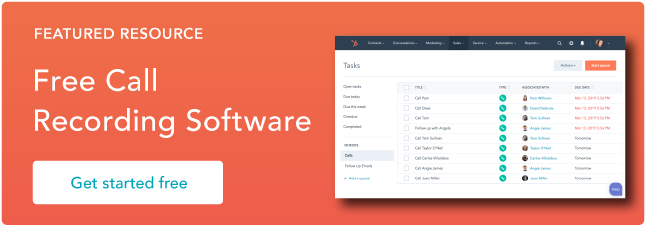Artificial intelligence resources are evolving from novelty to necessity in sales, and the massive investment companies are putting into these kinds of tools is a testament to that.

Research firm MarketsandMarkets predicts the global AI market size will grow from 58.3 billion in 2021 to a staggering 309 billion by 2026.
Given the ever-expanding place this kind of technology has in sales, it's becoming commonplace and sensible for any business to consider where these platforms can fit into their sales efforts.
There's a diverse array of AI-powered sales software that suit a wide variety of needs — many of which can accommodate virtually any budget. Here, we'll get a picture of how affordable AI can streamline your sales process and some of the best tools available in the space.
How AI Streamlines is Changing Sales
Virtually any business stands to gain something from incorporating this kind of technology into its sales process. But what does that "something" look like? What, exactly, does artificial intelligence do for your sales efforts? Kristin Hersant, VP of Marketing at Groove offered a high-level overview of what AI tools can do for you and your sales team.
AI for Sales Productivity
As she puts it, "Sales technology has evolved to a point where AI is now commonly built into platforms that capture vast amounts of engagement data. AI looks for patterns within the data and then makes recommendations for how sellers can improve their workflows and communications."
AI for Sales Forecasting
To state the obvious, a sales forecast is critical for business. AI can increase sales forecast accuracy with a real-time snapshot into the health of each deal in your pipeline. Armed with these insights, you have a better idea of whether to advance or pause deals.
AI for Prospecting
To be productive, a salesperson has to actually have time to sell. This is where AI comes in. It can identify behaviors and patterns in customer data, then apply those patterns to new prospects. The ultimate goal? Identify where they are in the pipeline to help sales reps focus on leads who will convert.
AI for Lead Scoring
AI tracks and compiles every transaction with a lead — from emails sent and voicemails left to meetings scheduled. AI automatically scores the healthiest accounts, allowing sales reps to better predict which contacts are most likely to bite.
What’s more, sales reps can get a complete view of the customer — resulting in more personalized interactions that leads value.
Types of AI for Sales
There are several categories of sales AI resources, but for the sake of this piece, we're going to focus on four of the most prominent, typically affordable types of platforms:

- Conversational Intelligence — resources that record, transcribe, and analyze phone calls.
- Voice and SMS — tools that leverage AI to improve your voice call and SMS outreach.
- Sales Engagement — software that informs how and where to share specific high-impact content to prospects while offering actionable insights on future moves.
- AI-Powered Account-Based Marketing — platforms that enable companies to better sync sales and marketing by surfacing leads and targeting companies that align well with their existing client base.
Let's see how this range of resources can improve your sales process.
Ways Affordable AI Can Streamline Your Sales Process
- Conversational intelligence platforms can identify particularly pertinent conversation points.
- Conversational intelligence platforms allow managers to browse and benchmark assessments of reps' calls.
- Voice and SMS platforms can expedite and optimize prospect outreach.
- Sales engagement platforms can offer actionable insights to improve your sales process.
- AI-powered account-based marketing platforms allow you to uncover demand and refine your sales efforts.
1. Conversational intelligence platforms can identify particularly pertinent conversation points.
Conversational intelligence platforms are designed, in large part, to pin down specific keywords and conversation topics that consistently emerge and resonate with prospects and customers. With the help of this technology, sales reps can tactfully direct conversations to points that will hit with the prospects they're talking to.
This kind of software also addresses the other side of the sales call token by helping sales managers identify ineffective topics and conversational strategies. Ultimately, conversational intelligence platforms streamline sales processes by trimming the fat from your sales calls.
It lets your reps know what and what not to discuss with prospects — putting less emphasis on the improvisational element of a sales call and focusing more on proven strategies backed by hard evidence.
Chorus AI, Deepgram, Observe.ai, Cogito, and Amenity Analytics are among the most popular conversational intelligence platforms on the market.
2. Conversational intelligence platforms allow managers to browse and benchmark assessments of reps' calls.
Some conversational intelligence platforms can provide real-time, actionable, AI-powered feedback on their calls. Using that data as a reference point, these kinds of platforms allow users to monitor and scan all the sales calls in progress across their companies.
Those capabilities are particularly useful for sales managers interested in having a bank of information to browse, benchmark, assess, and better understand their reps' calls. Having access to that kind of information gives management visibility into — and insight about — where their team has room to improve.
With that, managers can streamline their sales process by understanding the specific weak points they need to address with both individual reps and their teams as a whole.
Perhaps the most prominent platform with these capabilities is Gong.
3. Voice and SMS platforms can expedite and optimize prospect outreach.
AI-powered voice and SMS platforms help sales teams streamline their prospect outreach by using artificial intelligence to expedite processes like leaving voicemails, conducting outreach via SMS, and auto-dialing.
This kind of software manages to accelerate and optimize outreach without sacrificing the personal element of the process. Those functions I mentioned – specifically, voicemail drop and SMS outreach — are automated, but if the platform you choose to leverage is backed by solid AI capabilities, your prospects and customers won't be able to tell.
Voice and SMS platforms can streamline your sales efforts by stripping back some of the more grating, unnecessarily time-consuming aspects of your sales process.
If your business conducts outreach through voice calls or SMS, you can save a lot of time and spare yourself some tedious work by leveraging one of these platforms.
One of the preeminent systems in this space is Kixie — a platform that can seamlessly integrate with your CRM.
4. Sales engagement platforms can offer actionable insights to improve your sales process.
One of the primary benefits of a sales engagement platform is its sales intelligence capabilities — tracking all your calls, emails, and other outreach activity to identify what is and isn't working for you.
It considers factors like the mediums, frequency, and content of your prospect and customer contact — along with qualities relating to buyer personas, sales stages, business scales, and industry — to inform insight about how and when you should contact potential buyers.
Having that kind of information to support your sales process can take a lot of the pressure off your sales team and guesswork out of your efforts. With that kind of guidance and clarity, you can focus more on interacting with prospects without trying to hash out the best way to reach out to them on your own.
If you're looking for a platform with this kind of capability, check out Groove, SalesLoft, and Outreach.
5. AI-powered account-based marketing platforms allow you to uncover demand and refine your sales efforts.
As per HubSpot's own definition, account-based marketing is "a focused growth strategy in which Marketing and Sales collaborate to create personalized buying experiences for a mutually-identified set of high-value accounts."
There are several types of software available to support that process, but they're not all backed by artificial intelligence. AI isn't exactly an absolute necessity for ABM platforms, but those backed by those kinds of capabilities have a particularly high potential to streamline a company's sales process.
AI-powered ABM platforms can help you pinpoint where interest in your business is coming from and how your sales and marketing teams can best translate it into deals.
That perspective and departmental alignment streamline your sales efforts by ensuring that the prospects fed into your sales funnel are viable — making for more qualified leads and a cleaner, more easily trackable sales process.
6Sense — with its unique AI platform that leverages historical intent to reconstruct your business's account-based buyer's journey — might be the most notable software in this space.
The right affordable sales AI platform for a business will vary based on qualities like its favored medium for prospect outreach, its scale, the nature of its sales process, and its sales team's current performance.
Still, no matter where your company might stand in terms of those factors, you probably have something to gain from some form of affordable AI. So if you decide to implement one of these platforms, there's one key point to bear in mind above all others — the AI tools you leverage should support your sales efforts, not completely override them.
As Hersant put it, "Look for software that leverages AI to empower sellers as opposed to replacing them. At the end of the day, relationships still matter — especially in enterprise sales — so AI is most effective when it can surface insights that humans can’t, empowering them to build stronger relationships and generate more revenue as a result."


![Sales Close Plan: The Best Tool to Close Way More Deals [Template]](https://knowledge.hubspot.com/hubfs/sales-close-plan-1-20241125-8524726.webp)

![The Ultimate Sales Cheat Sheet Template to Help Boost Rep Success [New Data + Templates]](https://knowledge.hubspot.com/hubfs/ft-cheat.webp)

![Why Sales Activity Tracking Matters [+ the 10 Best Sales Goal Tracker Tools & Templates]](https://knowledge.hubspot.com/hubfs/image-1-1.webp)




